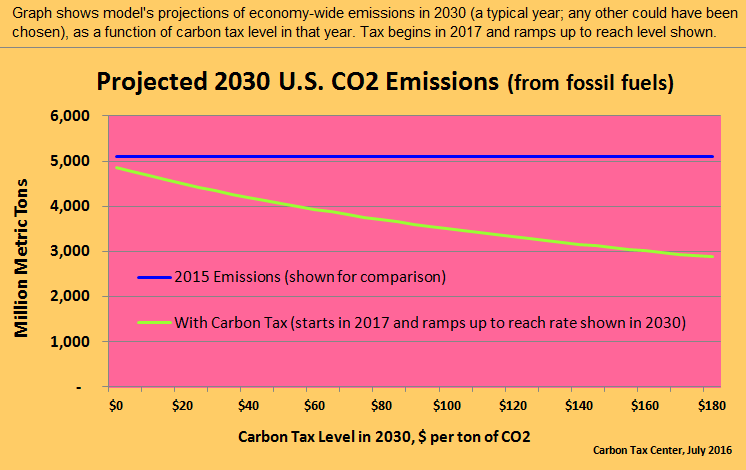The conventions are over, the country is pivoting toward the Nov. 8 elections, and Dave Roberts, Vox’s energy and climate blogger, is out with a post insisting, yet again, that “a carbon tax is not some magical climate cure-all.”
Roberts has said this before, many times. We (CTC) even posted a point/counterpoint with him after he poured cold water on carbon taxes in 2012, after Hurricane Sandy. Now, with so much going on — a glass ceiling-shattering nomination by the Democrats, a civil society-threatening nomination by the Republicans — should we care?

Does it matter that neither candidate advocates a carbon tax?
We should. For one thing, Roberts is an influential journalist; here’s NY Times superstar columnist Paul Krugman linking to Roberts last summer. For another, a carbon tax shattered its own vault of silence in the Democratic primary season; after Bernie Sanders’ unapologetic calls in speeches and the debates, advocating a tax on carbon emissions isn’t necessarily a ticket to political oblivion. Moreover, Roberts’ post today raised questions about a carbon tax’s magnitude that are worth addressing.
What set Roberts off this time was a recent editorial in Technology Review that chided the Democrats for “ignoring the one thing that could best help curb carbon emissions.” That thing is, of course, a carbon tax. The TR editorial dutifully blasted Trump’s climate denialism and the GOP’s labeling coal a “clean energy source,” and then said:
But the Democratic platform might not be meaningfully better. Although Hillary Clinton has a climate change plan, and it is supportive of President Obama’s Clean Power Plan (which is held up in the courts), and makes broad promises to cut subsidies for the oil and gas industry, it leaves out one big thing: a carbon tax. (emphasis added)
That last bit was too much for Roberts. Clinton’s energy plan, he wrote, would
- expand solar and other clean alternatives.
- increase US energy efficiency by a third and decrease US oil consumption by a third within 10 years of her taking office.
- aim to meet or exceed the carbon reduction target Obama promised in Paris: 28 percent under 2005 levels by 2025.
Roberts continued:
Clinton has said exactly how much carbon her plan would reduce. Would a carbon tax reduce more? It obviously depends! A high carbon tax would. A low carbon tax wouldn’t. A revenue-neutral carbon tax that reduces the income tax would be different from a carbon tax that funds clean energy deployment… The effects of a carbon tax depend entirely on its size and implementation details.
There’s some truth there. But let’s go further.
To begin, saying how much carbon you hope to eliminate isn’t the same as having a plan to eliminate it. And unless we’ve missed something, Clinton hasn’t spelled out how she’s going to cut oil usage by a third.
Spurred by plunging prices, U.S. consumption of petroleum products in 2015 rose for the third consecutive year and is now within 7 percent of the 2005 peak. (To see for yourself, download the latest Monthly Energy Review and navigate to Table 3.5, “Petroleum Products Supplied by Type,” totals column.) Without a stiff carbon tax that not only steers purchases away from SUVs and pickups but also counteracts the resumed trend of more miles driven, there’s no way the ambitious (on paper) Obama-Clinton fuel-economy standards can bend the petroleum curve sharply downward, as we’ve written here.
Indeed, our own modeling suggests that even a robustly rising carbon tax that reached triple digits in its tenth year would only cut oil usage from the 2005 peak by a quarter.

A briskly rising carbon tax can cut emissions fast and far.
The chances of achieving a 28 percent cut in economy-wide CO2 emissions by 2025 are brighter, partly because 2015 emissions were already 12 percent below the year-2005 benchmark. And our model predicts that a triple-digit carbon tax would, in its tenth year, be cutting CO2 emissions by 40 percent below emissions in 2005. As the Republican candidate remarked about a different type of performance, “I guarantee you there’s no problem” — provided the tax is high enough, as our graphic shows.
But that’s with a carbon tax. Without one — or some economy-wide carbon price — it’s difficult to see how the U.S. can progress from 12% below 2005 currently, to 28% below by 2025, as we wrote in 2014, following the announcement of the historic U.S.-China emissions pact. The picture is probably little different today, insofar as the positive changes since then — coal’s accelerated demise and the rapid uptake of ever-cheaper photovoltaics — are being undermined by the rise in usage of cheap oil.
There you have it: while the Clinton energy plan may be great for solar, it doesn’t map a path to deeply cut oil use and carbon emissions. In contrast, an economy-wide carbon tax — and here Dave Roberts is right, the tax must be robust, even steep — can do both.
Did Technology Review hyperventilate when it said that without a carbon tax, the Democratic climate stance in the election “might not be meaningfully better” than the Republican? Yes, somewhat. But let’s let the Pulitzer Prize-winning fact check site Politifact have the last word.
Two months ago, Politifact fact-checked this proposition: “Bernie Sanders says only he supports carbon tax and [an] ‘aggressive’ approach to climate change.” It rated Sanders’ claim — not just that he alone among the candidates supported a carbon tax but that his climate change approach was aggressive — “mostly true.”
That’s not to say we want Clinton to call explicitly for a robust carbon tax this fall. That’s a political calculation best left to others. But let’s be clear among ourselves of her climate plan’s shortfall vis-a-vis the task at hand.

David F Collins says
I am becoming more than a tad pessimistic. I have read of CO₂ activists who have spoken with the staff of most legistators in Washington. They report that these “solons” know full well of the dangers of continued CO₂ emissions but dare not do anything significant on the matter. This is the barrier blocking the Carbon Tax: they know it will work. Which is why the big money folks and their minions oppose it. They will not and cannot be appeased. Mrs Clinton is too close to them. Chanting “CO₂ delendum est” will not do the job. What will? Dunno.